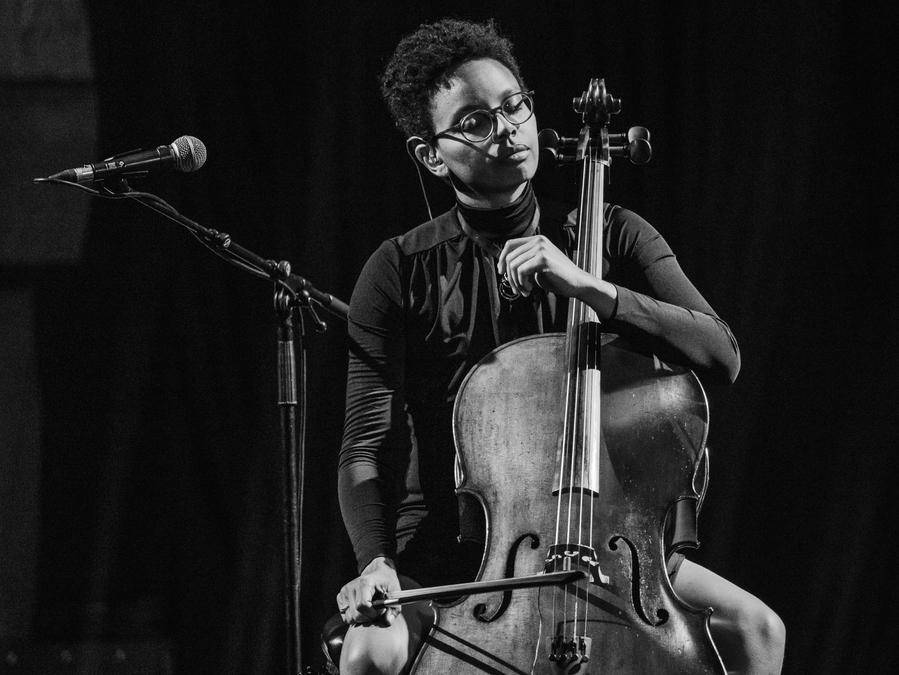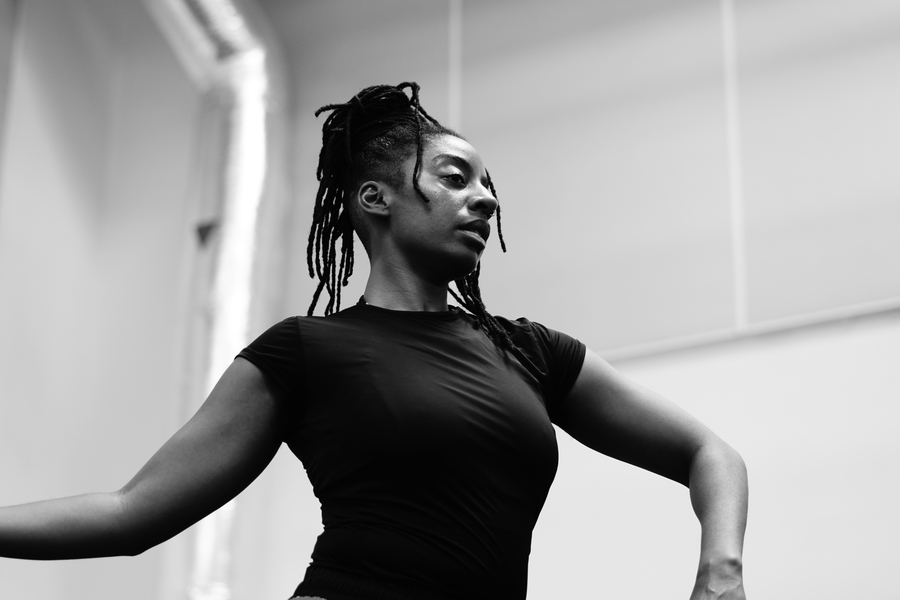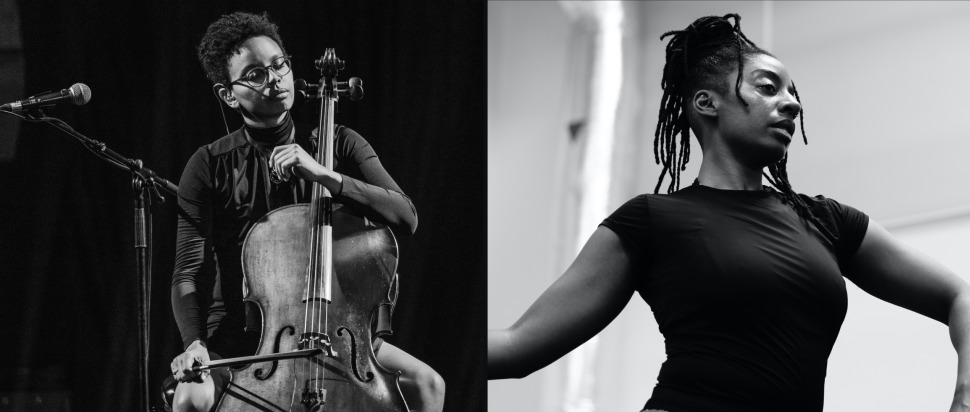Simone Seales and Mele Broomes on poetry performance Dearest
We chat with cellist and writer Simone Seales and dancer and choreographer Mele Broomes about Dearest, Seales' poetry album and zine being performed collaboratively at this year's Edinburgh International Book Festival
Off the back of a busy Pride season and in the middle of another Wet Hot Scottish Summer, it feels fitting that Simone Seales' project Dearest arrives in Edinburgh this August. A classical album combined with poetry spoken by both Seales and choreographer and longtime collaborator Mele Broomes, Dearest – alongside its accompanying zine – is a breathtaking reflection of first queer love.
The project has its origins in Todd Haynes’ Carol, the film adaptation of Patricia Highsmith's 1952 novel The Price of Salt (later also republished as Carol). The film depicts a lesbian romance between a photographer (Therese, played by Rooney Mara) and her older love interest (Carol, played by Cate Blanchett) who is navigating a divorce. Seales’ album started as a poem that they wrote two years ago, the eponymously titled Dearest, that “talks about this relationship that happened now ten years ago” and is named after “how Cate Blanchett says 'Dearest' in that letter,” they explain. The letter in question occurs in a scene where Therese is given a letter from Carol, formally and achingly closing the chapter of their relationship. Seales' poem was an articulation of what it means to both love someone and explain why you can’t be with them. “[It] formulated a space where I could understand my own feelings,” they explain.
The accompanying zine is designed by Glasgow-based multidisciplinary artist and long-time friend of Seales, Christian Noelle Charles. The colours are warm, reminiscent of various states of summer skies or the dream-like evocations of first love. Each song-poem takes its title from a different part of Carol's letter. Seales draws on the rich legacy of the zine-as-object, long used as a radical form of self-expression utilised by many movements, but holding particular weight amongst Black feminists as a means of reclaiming the narrative, often against mainstream media's one-sided or manipulative depiction of, well, everything. Seales also derived inspiration from Black queer feminist poets such as June Jordan who made them "understand poems,” they explain. “When I read [them] out loud, I was like, 'Oh that's my voice. I have a place in poetry and can reflect that.'"

Simone Seales. Photo: Joe Steven Hart
Seales, who has read 16 of Highsmith’s 22 novels, says that for them, the moral of Highsmith's novels is to tell the truth. “So many of the characters get into these situations because they have told a lie,” they explain. In response, Seales endeavours to seek truth through their work. Much as Carol anticipates a ‘perpetual sunrise’ – the lives that await her and her lover – Seales calls upon their own first lover to recall the sunrise they once gazed upon. Seales is doing something romantic with memory, but they are never telling a lie. “Acknowledging this beauty of first queer love [following] the trauma, the tension that can happen around it, how you ought to be for them to love you… it's something I really struggled to do,” they say.
It is a courageous, loving and terrifying choice to look back on a relationship from over a decade ago. Often people are quick to project a negative narrative onto an ex in order to hurriedly close the chapter. In rejecting such a practice, Seales challenges us to see first queer love for what it really was, whatever that might be. Their project is a proposal for us to step towards earnestness. To engage with Seales’ words and Broomes’ voice is to be held accountable.
I find myself in a place where this experience of first queer love can finally register. While I arguably could have claimed to know it following my first breakup last summer, I rejected the relationship for months to resist processing it. But talking to Seales and Broomes, I come to notice the ways that reflecting on this first love necessitates a settling into one’s self – a form of self-acceptance that was necessary for Seales’ own processing.
This theme of self-acceptance runs throughout Dearest and also Broomes’ own show Through Warm Temperatures, performing at Dancebase this Fringe and exploring Broomes’ complex and reorienting relationship with her body and nature. I wonder what is gained and lost in the journey towards self-acceptance? “Loving yourself is a never-ending journey,” Broomes explains. “In both our works there's a grapple, tension and release.” Seales agrees, adding: “[A] freedom to exist is gained. That desire I used to have that people had to validate my existence is gone. [Instead there are] all these facets of myself I actually like and do not want to change.”
Throughout Dearest, Broomes’ voice works to deliver the “warmth and love” alongside the "hardship, heartbreak and tension" that comprises a first queer love, Seales explains. On why her voice was such an important factor, Seales adds that: “I wanted the music to lead the emotion. In typical spoken word, it's the poetry that leads and the music that gives it vibes. [Here] I wanted the music to give the emotional content and the poetry to contextualise it, which is why I had Mele be neutral in her delivery. She's just so emotive and I was just like... stop... less emotion!” they deadpan.
Broomes laughs. “It was work to get that delivery!” she says, “[but] when a concept is felt, and I feel connected to, it's easier to arrive to it.” I listen to the titular Dearest in my kitchen with the sun glaring outside my window, petitioning for my presence outdoors. Broomes’ voice arrives just on time. When I hear her, I am called instead to sit down. I give the song another listen, reading the lyrics through the zine. In the same way that Seales was struck by Blanchett’s delivery of the letter, it is just as moving to hear Broomes’ own take on Dearest. If, as Seales says, “the cello is my voice”, then it is this voice of their's combined with Broomes’ that makes for such an intimate encounter, of another person articulating Seales’ letter to their first lover.

Mele Broomes. Photo: Osama Daffalah
I am curious about Seales and Broomes’ continuous collaborations. They choose each other as artistic allies on numerous projects, made possible by a mutual recognition of the respective values that bind and bond their work. Of their partnership, Broomes says: “Through collaboration [we are] learning how each other works. In regards to my work where we are meeting [is me] really learning and trusting through time, Simone's role in making music. It's learning how [the] next iterations of [our] projects happen. We've enjoyed our time together because there has been a flexibility and fluidity.”
Seales and Broomes move each other physically as well as musically, making ongoing commitments to ensure the intentions and visions for their projects are kept sacred through their willingness to learn from one another and take creative risks. For Seales, “a lot of our collaboration has to do with trust. I did some movement in a previous work, since I have had Mele do things musically the least I can do is return [the favour] and move a bit. There's a constant give and take in collaboration.” The pair seem empowered both by finding commonalities as well as points of divergence in their chosen mediums, never forcing them to merge but remaining curious in how they can find one another.
Collaborations are, ultimately, just another type of relationship. It is this vulnerability, intimacy and trust that undergirds Seales and Broomes’ powerful working relationship. I find myself drawn to this project of a first queer love that also leaves space for friendship. I think back to an interview Broomes did last year, where she discusses having found “friendship and solidarity” with 15 other Black women with whom she worked to inform her work for Through Warm Temperatures. Friendship and solidarity winds its way through both of their works; the kind of first queer love that Seales explores in Dearest becoming one of many different testing grounds for their presence. Queer love has infinitely extended my capacity for kinship with people I long desired to be creative co-conspirators; when I listen to Seales and Broomes bounce off one another, laughing wholeheartedly (infectious even through the Zoom screen) and looking both back and forward to their joint creative process, I am certain that this feeling is widespread.
Simone Seales and Mele Broomes: Dearest, Edinburgh Futures Institute, 13 Aug, 8pm, part of Edinburgh International Book Festival
through warm temperatures by Mele Broomes, Assembly @ Dance Base (DB1), 12-17 & 20-24 Aug, 1.15pm
